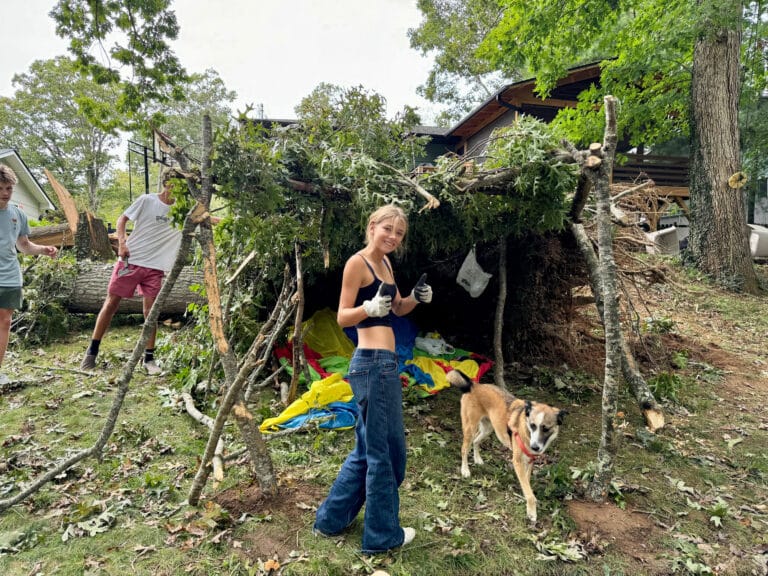Well after nightfall on Saturday, September 21, Tara Dower was eight miles away from becoming the fastest person to ever complete the Appalachian Trail (A.T.). She was also on the verge of a panic attack.
As the 31-year-old ultrarunner from Virginia Beach, Va., trudged through the pitch-black woods of north Georgia toward Springer Mountain, the trail’s southern terminus, she trembled with anxiety. After weeks of running 17 hours per day on blistered feet and very limited sleep, Dower was about to accomplish the unthinkable. And that scared the hell out of her.
“I didn’t know what this would mean for my life,” Dower tells BRO. “I hadn’t mentally prepared myself.”
But all that anxiety melted away about a mile from the finish line. Megan “Rascal” Wilmarth, Dower’s crew chief, says her friend was “zoned in” for that last stretch of trail, her pace quickening as she saw the warm glow of headlamps in the distance.
Just before midnight, Dower emerged from the woodline on Springer Mountain with a huge grin on her face. As friends and family cheered, she touched the summit’s bronze plaque, finishing her southbound hike in 40 days, 18 hours, and six minutes—13 hours faster than Belgian runner Karel Sabbe’s 2018 record.
“All these emotions that I hadn’t allowed myself to feel just hit me,” says Dower. “I started crying.”
Wilmarth describes that moment as a “whirlwind.”
“We were both bawling our eyes out,” she remembers. “It was a historical event that’s going to be the catalyst for so many women to act on their wildest dreams.”

Finding Her Footing
As a kid growing up in Wake Forest, N.C., Dower never thought she would set a record on the A.T. But she did like to go fast.
Her mom, Debbie Komlo, remembers the first time she watched her daughter run competitively at a middle school track meet.
“I started crying because her cadence and form were perfect, and she just looked so beautiful,” says Komlo. “I knew she had found her gift.”
Dower continued running through high school and then played rugby at East Carolina University. It was there, during her freshman year, that she watched a National Geographic documentary about the A.T. and decided to thru-hike after she graduated.

But in 2017, just eight days and 80 miles into her thru-hike, a panic attack forced Dower to pack up and leave the A.T.
“I was inside my tent having chest pains. I just felt disoriented and couldn’t get my breathing straight,” she remembers. “I had never felt that way before.”
In 2019, after taking some time away from the trail, Dower returned with her husband and completed a northbound thru-hike in five months and 10 days.
“I really feel like that was the year I was supposed to thru-hike the A.T.,” says Dower, who met Wilmarth during her trek. (She also earned the trail name “Candy Mama” for her maternal nature and sweet tooth.)
Hungry for more adventure, Dower began chasing fastest known times (FKTs). In 2020, she set a new speed record on the 1,175-mile Mountains-to-Sea Trail in North Carolina. In 2022, she did the same on the Benton MacKaye Trail, a nearly 300-mile footpath stretching from Springer Mountain to the Great Smoky Mountains. The next year, she shattered a long-standing women’s FKT on the Colorado Trail.
Dower also began competing in ultra-marathons, such as Ohio’s Backyard Ultra and the Hardrock 100.
“By now, I’ve done eight to nine 100-milers and a slew of other ultras,” says Dower. “I just keep pushing the boundaries to see where my limits are. I want to know what’s possible.”
That’s how Dower found herself on Mount Katahdin in Maine at 5:47 a.m. on August 12, determined to set the overall speed record for the A.T.

Rising to the Challenge
The first 10 days of Dower’s FKT attempt were grueling.
“In southern Maine and New Hampshire, it’s very brutal and technical terrain,” says Dower. “I was basically crawling up those mountains.”
To make matters worse, a weather system rolled in and dumped rain, making the trail slippery. These conditions slowed Dower down, putting her almost 150 miles behind schedule.
Wilmarth and Komlo had no choice but to devise ways to increase her daily mileage.
“We started nickel-and-diming,” says Wilmarth. “Every day, we were like, ‘OK, how can Tara get at least one more mile in?’”
According to Wilmarth, Dower averaged 50 miles a day in Maine and 40 miles a day in New Hampshire. Thankfully, the sun came back out when Dower crossed into Vermont, and she was able to knock out several 55-mile days. But around the mid-Atlantic, Wilmarth and Komlo had to make another tough decision.
“We were still behind schedule,” says Wilmarth. “So, Debbie and I pushed for a minimum of 58 miles a day with some 60-milers tossed in. Tara wasn’t happy, but it had to happen.”
To hit these extreme benchmarks, the crew followed a strict schedule.
At 3 a.m., Dower would wake up and wrap her blistered feet in Leukotape while Wilmarth spoon-fed her breakfast, and the rest of the team prepped her gear. For the next 17 hours, Dower would run, typically with a pacer, only stopping for a few short food breaks and 90-second naps.
Around 10 p.m., Dower would curl up inside a tent right off the trail or in Wilmarth’s camper van. After five hours of sleep, she would do it all again.
“It was hard,” Wilmarth admits. “I watched my friend turn into this shell of a human. It tore me apart.”

Rallying for the Finish
The last 129 miles were particularly challenging. Determined to outpace Sabbe’s 2018 record, Dower decided to push through this last leg with no sleep. But after logging nearly 60 miles, it was obvious she needed rest.
To boost her spirits, the crew allowed Dower to take a 20-minute nap in the van. When she woke up, she pleaded for another 10 minutes. The crew gave her three. When her alarm went off again, Dower still wasn’t herself.
Seeing that her daughter had hit a low point, Komlo shut the van door and offered a motherly pep talk.
“We often think we don’t have anything left to give, but we always do,” Komlo said. “So you need to go out there and empty your tank. You need to keep going.”
Those words carried Dower the last 60 miles to Springer Mountain.
Besides proving something to herself, Dower hopes her FKT motivates others to explore their endurance.
“I don’t think women are encouraged to test their limits, especially in athletics,” says Dower, who, with the support of Altra, has raised more than $50,000 for Girls on the Run, a nonprofit that coordinates running programs for elementary-age girls. “I want to inspire people, specifically young girls and women, to set big goals and to go for it.”
Cover photo: Virginia ultrarunner Tara Dower set the overall record on the Appalachian Trail. Photos courtesy of Dower







